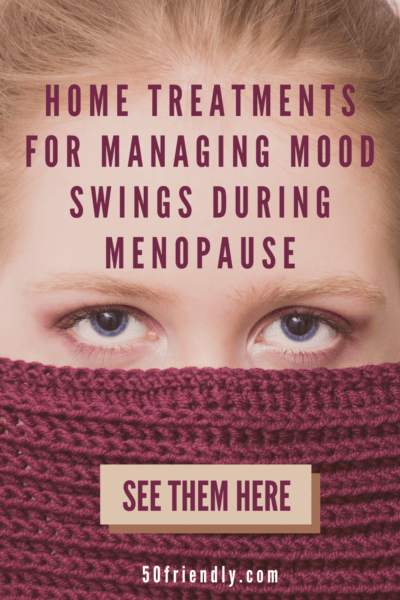Mental Health, Menopause, Mood Swings at Age 50

4 Home Treatment Tips for Managing Mood Swings During Menopause
Mental Health, Menopause and Mood Swings at Age 50. Well here you are – hello Age 50. Perhaps you’re starting to feel stressed, anxious and scared. Maybe worried about getting older, having an empty nest, losing family members. You’re having trouble sleeping, experiencing no sex drive, feeling scatterbrained, dryness to your lady parts, mood swings! Add those to any other physical changes you may be experiencing due to the decreasing levels of estrogen and progesterone – you find you’re a walking body of hot flashes and sweats. Welcome to Perimenopause and Menopause.
PERIMENOPAUSE MEANS NEVER HAVING TO SAY YOU’RE CHILLY 🙂
I can remember my first experience with PERIMENOPAUSE as it came early for me – I had just turned 50. One winter afternoon the family decided to go to the city to do some Christmas shopping. It’s a 140 mile round trip drive from where I live, so the hubs was at the wheel, me in the passenger seat, and my 2 boys in the back seat. What began as a nice relaxing drive, talking, laughing and jamming to music, ended as the drive from hell.
One minute I’m freezing, begging the hubs to turn the heat up – and then 5 minutes later I’m feeling so damn hot, sweating like crazy, and making every one roll their windows down. This went on for an eternity – a 140 mile eternity. My boys found it to be funny as they always enjoy seeing their mother being weird. But the hubs kept calling me a crazy woman (amongst other things) which of course didn’t sit very well with me. This turned into an argument, I’d get mad – he’d get mad, I’d be crying – then we’d be laughing. They didn’t understand what I was going through. And to think this was only perimenopause. I could hardly wait to go through the real deal – MENOPAUSE.

And then it came – my first realization I was going through MENOPAUSE. I was 53 years old, I’ve not had my period for a good 5 months, the hubs and I had been sexually active, I’ve gained a few extra pounds, the boobs are feeling sore, I’ve got headaches, and now I’m thinking I’m pregnant. Me – pregnant at age 53 – I was a nervous wreck !! My hubs was delighted as he’s always wanted more children, me included – but not at age 53. And I swear, if I had to hear about biblical Sara giving birth at age 70 one more time, I was going to really hurt someone. I was so scared – my moods were killing us.
Finally the hubs talked me into getting a pregnancy test kit from the store, I was even afraid to do this – what would happen if it came back positive and I was really pregnant? But like I said, moody me was a nightmare and a test was needed.
And so I got one – crying the whole time as I peed on the stick, freaking out as I waited the 3-5 minutes. I was so relieved when the test result came back negative – tears of joy streamed down my face as I told the hubs the good news – at least we knew. He was not amused tho when I also told him had it come back positive, I would have climbed our mountain and swan dived off. (well I wouldn’t have done that, but that was my frame of mind at the moment).
******************************
So do you see where I’m going here? This all totally explains why some women experience isolation and frustration during this time of their lives, totally explains how all this craziness can lead to anxiety or depression. Family members and friends have no idea how you’re really feeling.
And just so you know, not every woman will experience the above, and please just consider yourself blessed if you don’t. But for all the women who do – there are a few home treatments that can help deal with these peri and menopausal mood swings. Try applying these proactive lifestyle changes so the moods don’t affect your mental health. I just wish I had found them when I was going through these phases of my life – probably would have made mine, and my family members lives so much easier.
4 Home Treatment Tips for Managing Mood Swings During Menopause
from the Healthline Organization
1. GET AEROBIC EXERCISE – According to at least one study, performing 50 minutes of aerobic training four times a week helped to alleviate several menopausal symptoms, including night sweats, irritability, and mood swings. Exercise and physical activity release endorphins and other feel-good chemicals in the brain. Pick the time of day you are most likely to stick to a plan, and choose the exercises or activities you most enjoy. You may want to stagger your workouts. Try running one day and swimming the next, or go cycling every other day. You don’t need to train like an Olympian to get mood-boosting results. Taking a brisk walk before work or after dinner may be just as impactful on reducing mood swings as training for a marathon.
2. EAT HEALTHY FOODS – Eat healthy food. Eating healthy foods could be just as good for your mood as it is for your body. You may simply feel better after eating a protein-rich salad than you would after downing a quart of fudge ripple ice cream. A varied diet containing healthy foods, such as fruits, vegetables, lean protein, and fiber-filled whole grains, is more likely to provide you with omega-3 fatty acids, folate, and other nutrients that may help improve your mood.
3. LET GO OF STRESS – For some women, de-stressing may be as easy as losing themselves in a page-turning mystery novel. For others, gentle yoga, meditation, or quiet walks in nature may help improve mood and decrease stress and anxiety. Try experimenting with deep breathing exercises or yoga poses that help you cleanse your mind or that feel like a mini-vacation
4. GET ENOUGH SLEEP – Not getting enough shut-eye can add to irritability and mood swings. Create a nighttime routine that supports drifting off to sleep comfortably. Shutting off electronic devices, making sure your room is cool in temperature, and eliminating ambient light may help. Avoiding caffeine and alcohol can also help you to maintain healthy sleep cycles. Sleep should last 7 to 8 hours to allow healing and repair of immune function.
******************************
There are also medications that can be prescribed by your physician to help with menopause. I personally am not an advocate of going this route, but if this is your jam, then by all means talk with your doctor.
So a final note on all this menopause talk – do you know what the true blessing was? It was when that final 12th month came of me not having a period. I knew right then I was home free – and the family was so excited to have the “normal me” back. Haha – maybe they should have watched what they wished for 🙂
Read Up on What You Can Expect When You Turn 50. And stay tuned as the next posting will be on Keeping Your Immune System Healthy after 50. Ciao
